The Saturday Read: Glass Houses
Inside: The Blue Labour renaissance, Tom Holland on the Caesars, the Long Seventies, White Lotus, Britain's strictest head teacher, Perry Anderson and Roger Casement.
Good morning. Welcome to the Saturday Read, the best of the New Statesman, in print and online this week. This is Finn with Nicholas and George.
The maverick Labour peer Maurice Glasman made headlines this week, after an exclusive interview with our own George Eaton. Maurice, founder of Blue Labour, called for Attorney General Lord Hermer to be sacked and described him as an “arrogant, progressive fool”. Glasman has not necessarily created an ideological split at the heart of Keir Starmer’s administration, but he has revealed a serious fault line.
Glasman is an iconoclast with an unusual intellectual hinterland: Aristotle, Burke, German industrial democracy. But his politics – socially conservative instincts with traditional left wing economic thinking – might be back on the ascendancy. Trump’s election signalled the feted “vibe shift” and now the progressive liberal establishment, hegemonic over the 2010s, is losing its grip on the machinery of the state. And as Reform threaten to cannibalise Labour support, the party is scrambling to adapt: as Andrew Marr writes in our cover story, the new-found hawkish immigration rhetoric is the best evidence of a party re-casting itself under this new reality.
Hermer (and at least until recently, Starmer) represent the progressive wing, while Glasman, Morgan McSweeney and Labour MP Dan Carden are standard bearers of the socially conservative ethos. “Is this now a Blue Labour government?” George asks.
Perhaps it is too early to tell. But, if the idea of a cosmic battle for Labour’s soul sounds unsettling, Andrew offers some advice: consider reading some “soothing” Hegel. Might as well!
1—“Demands of the counter-revolution”
And here is Starmer as Martin Luther… accompanied by Andrew’s analysis on the Prime Minister’s Reformation. The child of progressive legalism is abandoning his heritage, and nailing his new hard-nosed theses to the door of Number 10. FMcR
Let’s take, instead, a step back. Starmer still has a huge majority and more than four years to play with. There is a reshuffle coming but both he and Reeves know that, though she has made some serious political mistakes, no Prime Minister can sack his Chancellor this early. He has largely purged his party of the left. He is also doing quite well in handling the unpredictable Trump, emphasising personal friendliness, avoiding confrontations. There is no single obvious alternative leader within Labour. The most active organisers on the back benches – the Blue Labour and Red Wall people – are essentially on Starmer’s side. So when we say, “It can’t go on like this,” the honest response is: but it probably will.
2—“Sweeping action, punctilious detail”
It is a delight, of course, to have Tom Holland in these pages, and on such a seminal text! He contends that Suetonius’s The Lives of the Caesars offers the true blueprint for writing about power. I contend that these 12 biographies are a mandatory read for a basic political education. FMcR
And so they remain to this day. That Rome tends to live more vividly in people’s imaginings than other ancient empires owes an inordinate amount to Suetonius. Pharaohs and shahs may have presided over civilisations as brilliant and influential, but no one ever wrote about them as Suetonius wrote about the Caesars. His subjects seem familiar to us as few other rulers from antiquity do. They wrestle with funding shortfalls, foreign policy crises and sex scandals. We are shown their tastes, their foibles, their eccentricities. The chilly marble of their portrait busts is transfigured into flesh and blood.
3—“The pretence is over”
Via Thomas Jefferson’s Declaration of Independence, America wrote itself into existence; it has an above average sense of self-definition. But it is no beacon of freedom, writes Hans Kundnani. Thanks to the Trump presidency, the imperial realpolitik that really drives the country is visible to all. NH
Franz Kafka never visited America. But at the beginning of his unfinished novel Amerika, Karl Rossmann, a 17-year-old German boy, is exiled after being seduced by a maid and getting her pregnant. Arriving in New York Harbor, “he suddenly saw the Statue of Liberty, which had already been in view for some time, as though in an intenser sunlight. The sword in her hand seemed only just to have been raised aloft, and the unchained winds blew about her form.” It is not clear if Kafka knew the Statue of Liberty holds a torch, not a sword. But the image of the statue with a sword is evocative and resonant – especially since Donald Trump became president again last month. Like Kafka’s protagonist, we seem to be seeing the US in an “intenser sunlight” – and what we see is an America that threatens rather than offers hope.
4—“Nasty rich people”
Are there any better or more durable subjects for satire? In recent years, television has taken up some of the slack literary fiction has left behind in this field – Succession, but also The White Lotus. Rachel Cooke relishes another glorious dose of emptiness and greed. NH
After two triumphant series, we know what to expect from The White Lotus’s sharp-eyed puppetmaster, Mike White. Another group of rich and obnoxious Americans will arrive by boat at an island resort whose waving staff proffer first garlands, and then the golf buggies in which they’ll be transported to their adult playgrounds (believe me when I tell you that the words en suite hardly touch the sides of the bathrooms here) – cue more trouble in paradise. Somehow, though, this has surprisingly little effect on one’s relish for what lies ahead. As I watched, I caught myself gleefully rubbing my hands together. Part of the show’s intense satisfaction has to do with schadenfreude, and having just shelled out for a new boiler, I can hardly wait for them all to get it.
5—“Schemed to destroy”
Since Brexit, no silhouette has so dominated Westminster’s imagination as the strategist Spad with the PM’s ear. Cummings and now McSweeney have had even their “most gnomic utterance studied for significance”. Jason shines light on dark arts. GM
It’s never wise for a special adviser to become the story but this happened to Cummings, whose defining role in the Vote Leave campaign was reimagined by James Graham in the TV drama Brexit: The Uncivil War – and is now happening to McSweeney, the principal character of Get In. Through his work at Labour Together, then as head of Starmer’s leadership campaign and, later, the party’s election strategist, “the Irishman”, as Maguire and Pogrund call him, did more than any elected politician to create the conditions for Labour’s victory.
To enjoy our latest analysis of politics, news and events, in addition to world-class literary and cultural reviews, click here to subscribe to the New Statesman. You'll enjoy all of the New Statesman's online content, ad-free podcasts and invitations to NS events.
Happy Valentine’s folks. I’m sure the flowers you sent are being enjoyed as we speak, on their recipient’s table, rinsed in the fresh sun of a bright weekend morning. But hopefully they’re not roses. Our gardening columnist Alice Vincent warned this week that those old standbys have been cliché since Chaucer, are covered in pesticides and a dozen of them produces as much carbon as 35 steaks. Opt instead for camellias, cyclamens, winter cherry blossom or even radicchio (?).
I don’t mind telling you that I dispatched a bouquet myself this year. Sadly it was yet another loss for the dutiful romantics, as I’d ordered roses weeks ago. Happily, though, Will Dunn arrived in time to prevent a second error in costly courting. Steer well clear, he cautioned in this week’s Money Matters, of diamond rings. They depreciate even faster than a new car, and the standing value has halved in the last two years.
So that’s no roses, no diamonds, and was there something about no juicy rib-eyes in there too? It’s a lot to remember. But who thought the course of true love ever did run smooth?
For a growing number of investors, private markets are becoming a more attractive option as they seek out new ways to maximise returns. In the search for diversification and optimised returns, many are putting their money into funds that invest in private companies. To understand more about this complex and challenging market, click here to see the analysis from State Street who help institutional investors.
6—“Badenoch is worried about me”
Most great artists resist the appellation “voice of a generation”. Not the Saturday Read’s own Nicholas Harris. Directly the Times launched its “landmark” Gen-Z survey, Nick stepped forward gamely – no one would say prematurely – to take up the mantle, and tell us what it all means. GM
It’s not the first time I’ve read about myself in the papers. It’s become an odd hobby, actually, sort of like being famous, though most famous people (other maybe than Arthur Scargill and the Cambridge Five) didn’t have to read about themselves as a kind of enemy within, noxious fifth column or – in the leaden clichés of the Leader of the Opposition – a “wake-up call” that reveals “what happens when we let divisive narratives run wild without setting the record straight”. We’ve received much worse coverage in recent years: chastening descriptions of the national sex drought for instance (alongside quite contrary and detailed descriptions of a polymorphous kink boom). The other weekend we were lobbying for fascist takeover, longing for some Anglo-Duvalier and their troop of aiguilletted officers to sweep to power and stop the rot. But like all other inquiries of the soul of Gen Z this one only ever rings half true – and Badenoch’s response continues to misread an angst which is no less real for evading simple definition.
7—“Overheating and static economy”
There were no party balloons this week when it was announced that the British economy had unexpectedly grown (by 0.1 per cent) in the final quarter of 2024. How will Rachel Reeves get UK plc firing again? By escaping the tired paradigms of the 1970s economic crisis, says Larry Elliott. NH
Now it is Thatcherism that seems empty and delusional. Britain needs higher levels of public and private investment, an industrial strategy backed by serious money, a bigger role for trade unions, and a Green New Deal to both provide well-paid jobs and decarbonise the economy. The long 2010s began with the collapse of Lehman Brothers in 2008 and are still going on. But our own period of extended crisis is still shaped by false consensus built half a century ago. As in the Long Seventies, there are competing visions for what should happen next. This time the left needs to win that battle.
8—“Between fault lines”
Among the pantheon of Ireland’s revolutionaries perhaps none defy easy categorisation as much as Roger Casement. Irish historian Paul Rouse considers the man - executed for treason in London, 1916 - and his much-questioned martyrdom. FMcR
Even as his sense of Irishness was evolving, however, Casement was still happy to accept a knighthood from the British government, which honoured him for his humanitarian work in Africa and South America. The complexity of such overlapping identities in Ireland defies those who wish to paint the past only in stripes of green or orange. That he was perceived as an Ulster Protestant nationalist is vital. He was proud to be a knight of the realm and an Ulster Protestant – but his increasingly strident nationalism saw him depicted by the Times as someone who could not be considered “a typical citizen of Ulster”. This depiction infuriated him.
9—“Discipline, rules”
Congratulations to Hannah – nominated for Feature Writer of the Year this week! And here is her interview with Katharine Birbalsingh, the headteacher currently involved in a nasty row with Education Secretary Bridget Phillipson. Hannah visited the Michaela School to put her ideas to the test. GM
When it was time to sit down to eat, I copied others. “Go” was our cue. Even then, we did not have free rein to chat, but were provided with the topic of conversation: Stonehenge. None of the six children on my table had visited, and were impressed that I, Miss Hannah, had. Throughout lunch, the teacher who’d led the poetry performance would raise her arm, each time providing the cue for the children to stop, sit up straight and do the same. I didn’t finish my lunch – there wasn’t time.
10—“Disturbingly blasé attitude”
Never forget male violence, Sarah Ditum warns. Most people in the debate around the assisted dying bill are operating with good intentions. That doesn’t mean they haven’t chosen comforting lies over harsh realities. We must mind that the healthcare system does not become “an executioner for those most in need of protection”. GM
Or there’s the case of Stuart Mungall, who in 2011 smothered his wife Joan with a pillow, then took an overdose which failed to kill him. Joan had the degenerative condition Pick’s disease and only months to live, but, prosecutors said, she had never expressed a wish to die. The day before Mungall killed Joan, she was said to have told a nurse that she was “taking it all in her stride”. Like Knight, Mungall represented his actions to the court as a “mercy killing”; like Knight, he pleaded guilty to manslaughter, and was given a suspended sentence.
George’s Best of the Rest
Lily Lynch: Sense of an ending
Christopher Clark: The Angela Merkel’s duality
Hugo Rifkind: Give them better lives and Gen Z will be proud
Ted Gioia: Coltrane is still supreme
Hermione Hoby: Hot divorcee club
Izabella Tabarovsky: Cancelled in Finland
From the archive, Gerry Brakus: My best phone picture
500 eggs stolen in Seattle (big omelette!)
And with that…
This Valentine’s Day I saw the man of my dreams. Last night Perry Anderson was lecturing on “Regime Change” at London’s Senate House. Anderson is widely regarded as one of our greatest living historians and essayists, as well as a prose stylist of great flourish. And the New Statesman turned out en masse for him: myself, George and our redoubtable sub-editor Barney Horner. The rest of London’s intelligentsia were there too. In the audience I spotted Gavin Jacobson and Leo Robson (NS old hands), as well as Stefan Collini, China Mieville and (Barney told me) the art critic TJ Clark.
Anderson is the kind of speaker who, simply by approaching the lectern, triggers a reverential hush. No wonder: the lecture, on the rise of neoliberalism and the ensuing financial crash of 2008, was a tour de force. He made a distinction between the left and right variants of populism that have emerged since: both are opposed to the established political order, but the right - with its appeal to emotional and xenophobic instincts - has the upper hand on the prevailing question of the day, mass migration. Until the left can articulate a serious position on this fact, it is destined for defeat. It was a rare direct political intervention from Anderson, and a provocative challenge to his audience, much debated in the pubs of Bloomsbury afterwards.
The New Statesman is home to the best writing on politics, culture and ideas. To stay up to date, subscribe using the link above.
— Finn, Nicholas and George.


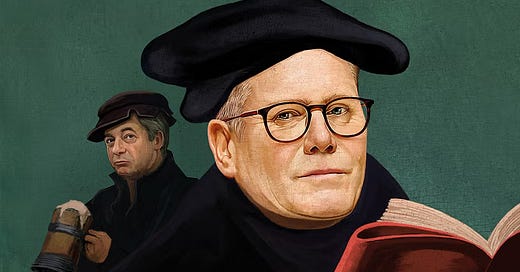


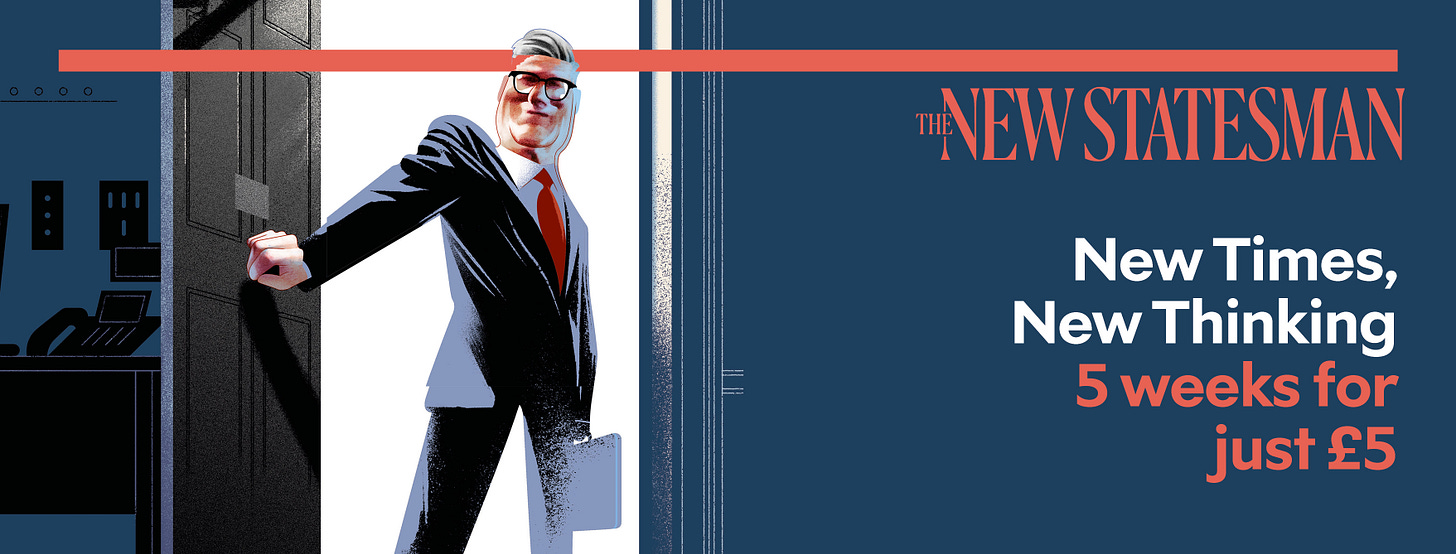

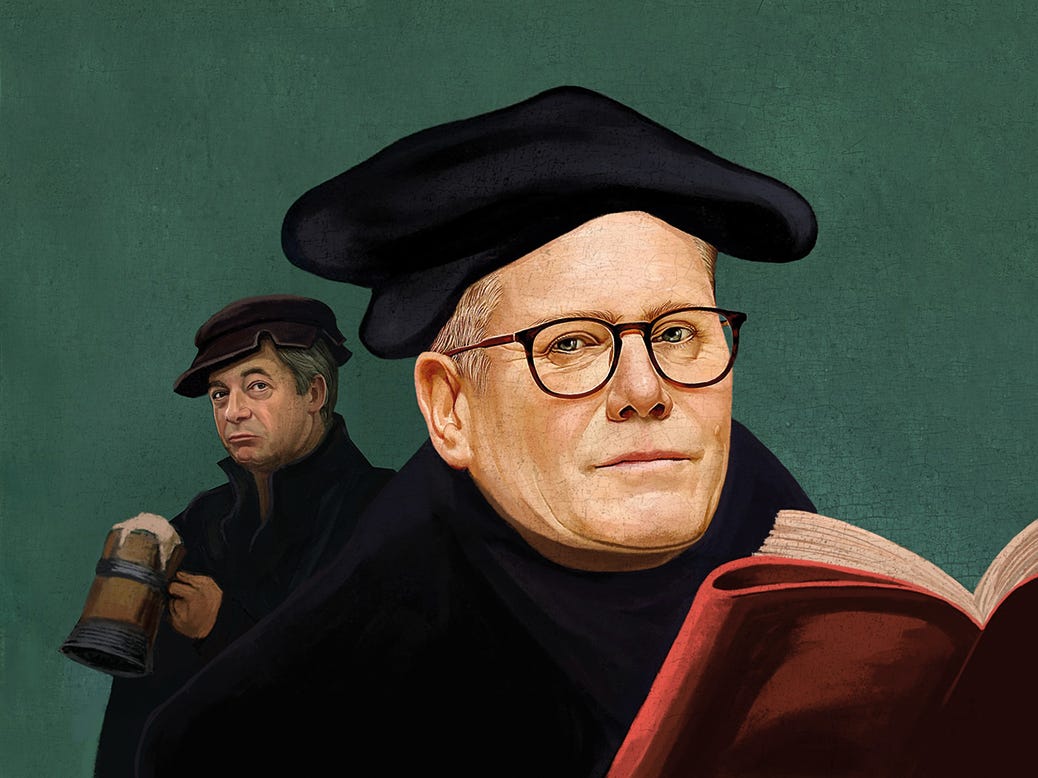



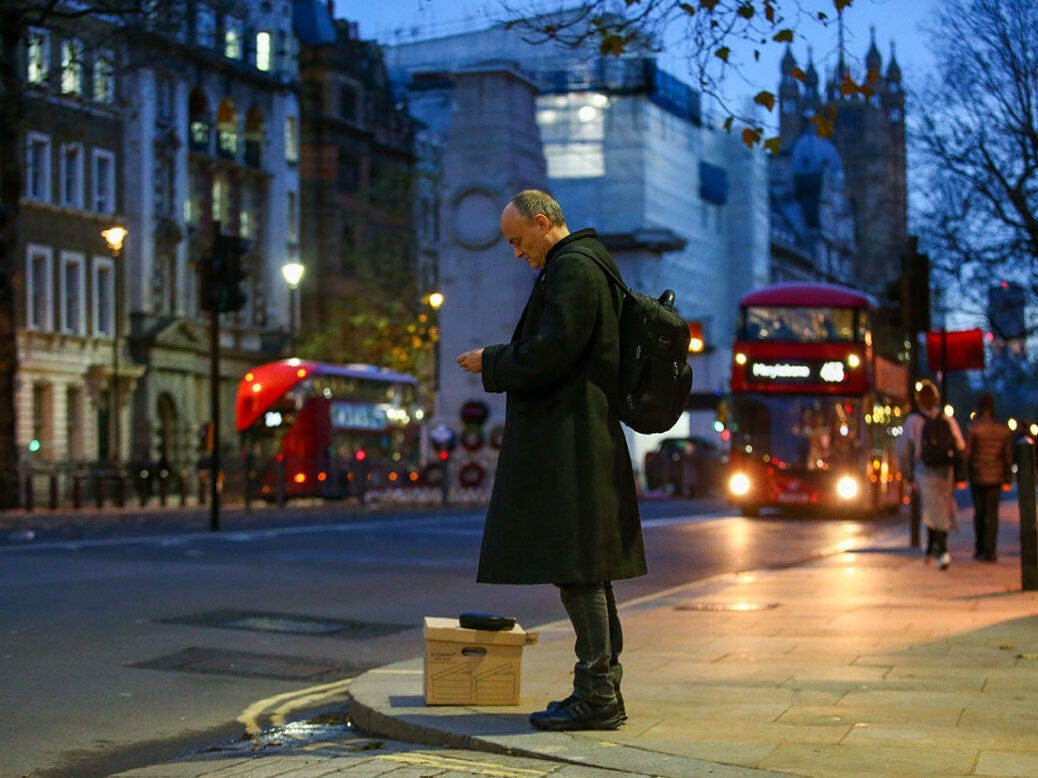



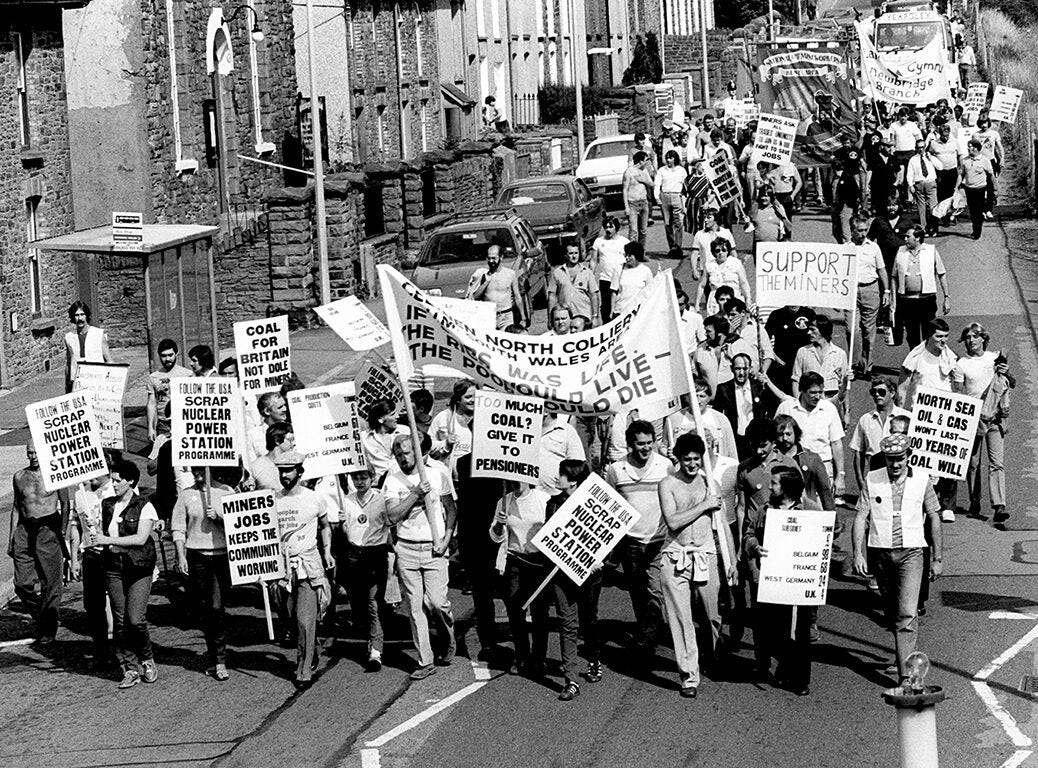
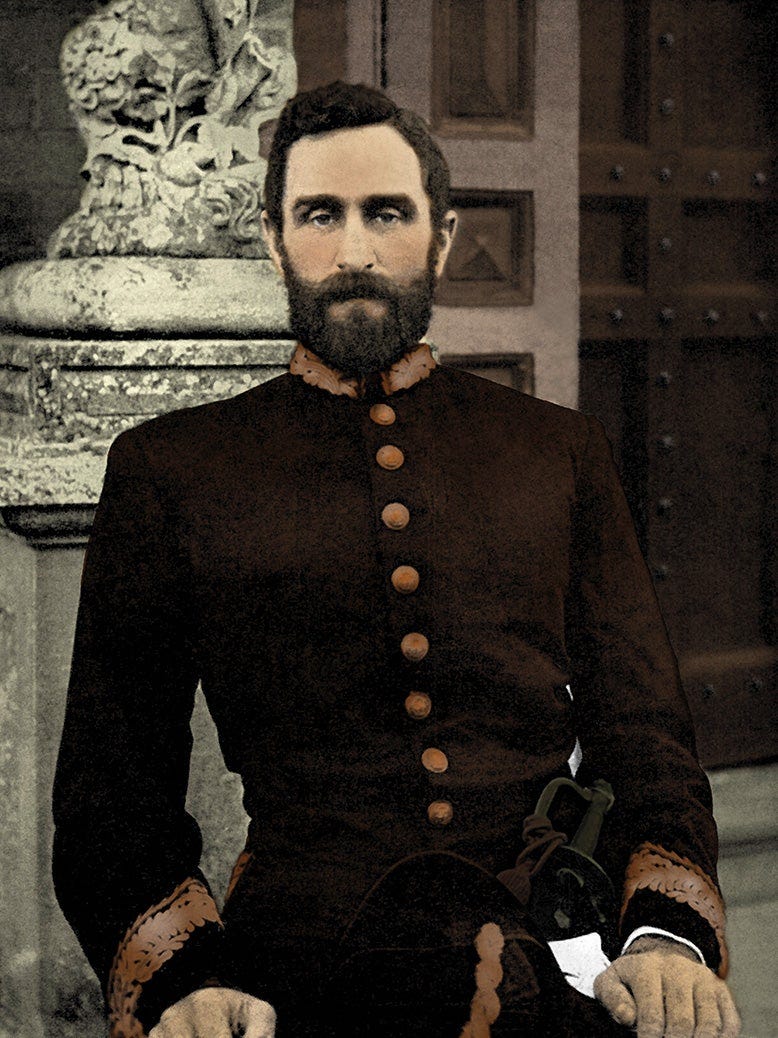



Wow,amazing, it's only 2025 and the NS has discovered the US Imperial Project which after all has only been underway since the end of WW2. For them and other slow learners I would recommend reading Tom Dispatch which will give you a view of that Project from the perspective of the US left,what there is of it.
This issue might be the most layered and thematically resonant Saturday Read yet—like a Hegelian Valentine’s card wrapped in a Caesar bust.
Andrew Marr’s framing of Starmer as a Reformation-era figure abandoning his legalist heritage hit particularly hard. If we’re watching the progressive project give way to Blue Labour populism, then the question isn’t just “who’s in charge,” but “what’s the soul of this machine?” Glasman's reappearance feels less like a cameo and more like a power-play from the ideological shadows.
Tom Holland’s reflection on Suetonius is one I’ll revisit—especially his take on the biography as political anatomy. It reminded me how little separates modern power from classical performance. We’re still governed by people who want to be both feared and adored—and we’re still seduced by the spectacle.
And kudos to the piece on White Lotus for capturing why we keep returning to stories of decadent decay. In an age of economic precarity, watching the elite self-implode on screen offers a weird kind of moral equilibrium.
Also: George’s Valentine’s dispatch—no roses, no diamonds, no steaks—felt like a tender post-capitalist koan. A reminder that even romance, in 2025, is downstream of politics, ethics, and emissions data.
Let me know if you want to tweak it to include a plug for Permission to Be Powerful or reflect your own Substack audience!